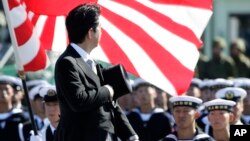The security alliance between Japan and the United States is expected to feature prominently in talks between Prime Minister Shinzo Abe and President Barack Obama during the Japanese leader’s state visit to Washington next month, according to foreign policy experts.
His visit will come at a time when Japan is forming a more assertive foreign security policy, something some officials in Washington are welcoming.
The cornerstone of this policy has been an agreement last year to reinterpret part of the Japanese constitution, known as Article 9, which prohibits the country from going to war or having a military. What this means will depend on security legislation passing through the Japanese parliament, said Scott Harold, deputy director of the Center for Asia Pacific Policy at the RAND Corporation, a Washington-based research institute.
“We have long wanted the Japanese to reinterpret that (Article 9)… It’s about burden sharing,” a U.S. defense official told VOA ahead of Abe’s visit.
Analysts believe the agreement for the reinterpretation was at least partially based on the need for Japan to play a greater role in defense cooperation between the United States and Japan, something Abe has been pushing.
Japan-US Security Alliance
After the Islamic State terrorist group beheaded two Japanese hostages in Syria recently, the local and international media began raising questions about how Japan would respond. However, well before that incident occurred, Japan started taking steps toward creating a more proactive security policy.
While the Japanese constitution has remained largely untouched for more than half a century, the reinterpretation could allow Japan to come to the defense of an ally under attack, known as “collective self-defense,” said Tetsuo Kotani, a senior fellow at the Japan Institute of International Affairs, a Tokyo-based institution.
The Japanese government has argued that if, for example, a U.S. vessel was to come under attack near Japan, it would have been unable to help the vessel because the attack did not threaten Japan.
Any opening in security legislation is welcome, said Lt. Col. Jeffrey Pool, Pentagon spokesman for the Asia-Pacific region. The reinterpretation of Article 9 could, for example, potentially open the way for Japan to take part in more multilateral exercises in the region without the U.S. having to directly get involved, Pool said.
A Japanese official in Washington familiar with the proceedings told on the condition of anonymity that while it could be seen as an increase in burden sharing, it was also “about Japan playing a bigger role.” He added that it may allow the U.S. to “contribute to the stability of the region in a bigger way.”
US-Japan Defense Cooperation Guidelines
In addition to the security legislation in Japan and the reinterpretation of Article 9, the U.S. and Japan are working on revising guidelines on defense cooperation last revised in 1997.
Pool, from the Pentagon, said Japanese officials were making many of the updates to the document, with different options on the table in case security legislation in Japan did not pass. The document is expected to make advancements in the fields of cyber security and space cooperation, he added.
The Japanese official in Washington said the guidelines were “loosely linked” to the security bills that are expected to be presented in parliament.
Shihoko Goto, senior Northeast Asia associate at the Woodrow Wilson Center in Washington, said the moves for a more assertive security policy also stemmed from concerns about the seriousness of the Obama administration to rebalance toward Asia. A number of different international crises have the attention of the U.S., from the Islamic State in Syria and Iraq to the low-intensity conflict in eastern Ukraine, Goto said. This, she added, was causing concern in Japan about whether the rebalancing toward Asia was a priority or not.
Regional Dynamics
Analysts agree that in addition to appeasing the United States, Abe has been pushing for the reinterpretation because of personal ambitions and recent geopolitical dynamics.
Currently in his third term -- he won his most recent term in December after winning a snap election -- Abe leads a stable government and has been more focused on creating a more forceful Japan that will “remain relevant in the region,” Goto said.
“If he’s thinking about his legacy, he wants to make sure Japan’s voice is heard on the international stage,” she added. Japan approved a record defense budget of $42 billion this year.
In addition to a nuclear North Korea, Japan is concerned about what is seen as a more aggressive China, which announced a $145 billion military budget, second only to the U.S., said Goto.
The most high profile dispute between Japan and China has been over a chain of uninhabited islands in the East China Sea. Even though the dispute over the islands has been going on for decades, a decision by China to create an air defense zone over the region caused particular anger and concern in Japan.
Despite the perceived threats around Japan, analysts believe that passing any security legislation will not be an easy task because of the peaceful history of Japan since World War II. At a party convention earlier this month, the opposition Democratic Party of Japan vowed to oppose Abe’s moves.




